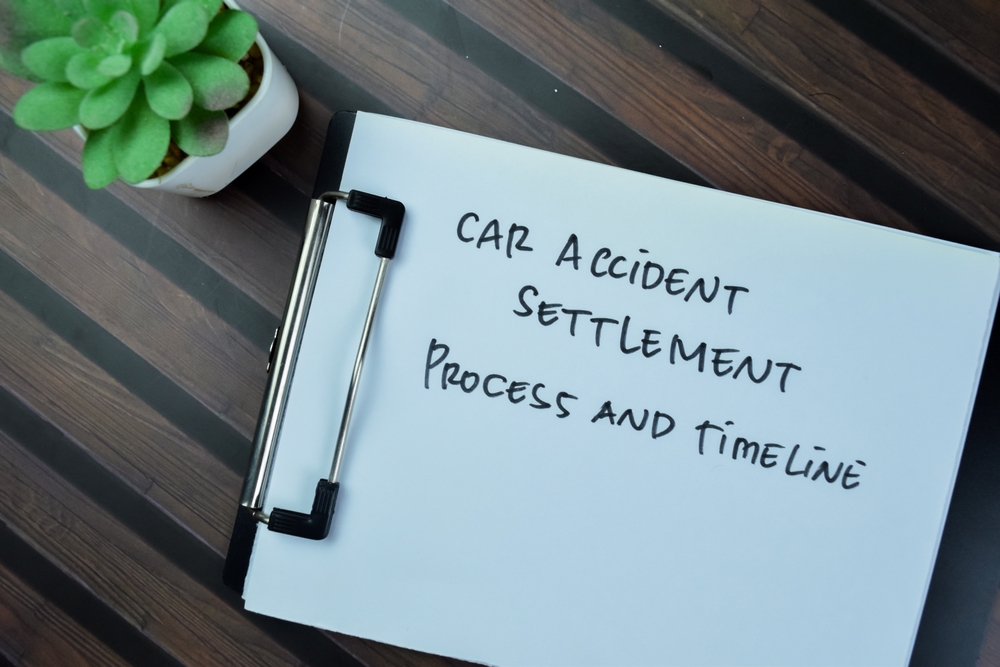A car accident is a traumatic event that leaves many individuals overwhelmed and anxious. Amid coping with injuries, repairs, and the emotional distress that often accompanies such incidents, victims find themselves facing a critical question: Should they accept the first settlement offer that comes their way from the insurance company?
While it's tempting to say yes to wrap up the cumbersome process, never accept the first offer unless a lawyer reviews it.
This decision is far from straightforward and could significantly reduce your financial recovery.
In this blog, we'll explore the tactics used by insurance adjusters, why initial offers are often low, and how to navigate the tricky path of settlements effectively.
If you’ve been injured in an accident, contact a Wisconsin car accident attorney for a free consultation and find out how much you could be entitled to with an accident settlement.
Why Do Insurance Companies Offer Money When You’re Hurt in a Car Accident?
After a car accident, insurance companies are often quick to offer a settlement.
Why do they do this? To put it simply, monetary damages are the legal system's way of making people whole again.
The Legal Perspective: The Role of Monetary Damages
When you're injured due to someone else's negligence, the at-fault party should make you whole through compensation.

The principle is based on a foundational tenet of tort law, which aims to restore individuals who suffered harm back to the condition they were in before the incident, or as close to it as possible. However, this is where you will see the limitations of the legal system.
Money damages can never truly restore a plaintiff to their pre-tort or pre-accident condition. Even if you receive a financial settlement, the emotional trauma, the pain and suffering, the time lost—these are aspects of your life that a sum of money can never truly compensate for.
It would be a rare circumstance, indeed, for someone to agree in advance to endure an injury or disease for monetary damages.
The Pragmatic Angle: Why Insurance Companies Are Quick to Offer a Settlement
From a more practical standpoint, insurance companies are businesses looking to protect their bottom line. The quicker they can close a claim, the less time and resources they have to spend on it.
That's why they may present you with an initial offer soon after the accident occurs, often before you have a clear understanding of the full scope of your injuries and what your claim is worth. They bank on your need for immediate relief to get you to settle for less than you might be entitled to.
The Interplay of Law and Real-world Tactics
The legal system offers the avenue of monetary damages as an attempt to make things right, but insurance companies use this mechanism to their advantage.
They understand that while money can't reverse what's happened, the allure of a quick settlement can feel compelling when you are hurt, confused, and possibly in financial distress.
Understanding this dynamic is the first step in making informed decisions about whether to accept an initial settlement offer.
It's often the case that with this interplay of law and insurance companies, the counsel of a skilled personal injury attorney becomes invaluable.
Navigating the legal landscape of car accidents involves more than just calculating immediate medical bills or repair costs. You must consider long-term financial, emotional, and physical consequences.
Accepting the first offer might solve your immediate cash concerns, but it can also mean leaving significant money on the table—money that could pay for your recovery and ongoing well-being.
Tactics Insurance Adjusters Use to Encourage Quick Settlements
The insurance adjuster will minimize the company's payouts, and they employ a variety of strategies to achieve this goal.
A lawyer can empower you to negotiate more effectively and safeguard your interests.
- The Urgency Illusion. Adjusters often create an illusion of urgency, suggesting that the first offer is a limited-time opportunity. This may pressure you into accepting quickly, without assessing the full extent of your needs and rights.
- Incomplete Assessments. The initial offer is often based on an incomplete assessment of your situation. Adjusters might not account for long-term medical costs, emotional trauma, or loss of income that you could incur due to your accident.
- Framing the Offer. The way they present the offer can mislead you. Adjusters are skilled in framing the offer as generous, often comparing it to lower averages or typical cases that might not apply to your situation.
- Downplaying Injuries and Damages. Another common tactic is to downplay the severity of your injuries and property damage. They may question the necessity of specific treatments or repairs, arguing that the claim shouldn’t include them.
- Using Recorded Statements Against You. Adjusters frequently ask for recorded statements to use your own words to limit the value of your claim. They may ask leading questions designed to get you to minimize your injuries or admit fault unintentionally.
- Waiving Future Claims. Many initial offers come with a catch - you waive the right to future claims once you accept the settlement. This can cause problems if you discover later that your injuries require more extensive treatment than initially thought.
A lawyer can counter these tactics effectively. This support will better equip you to recover the full extent of your damages.
Why the First Offer After a Car Accident Is Often Inadequate
Insurance companies try to maximize their profits by offering low settlements.
The following are some reasons why the first offer is often inadequate:
- Immediate Medical Expenses vs Long-Term Care. The first offer might cover your immediate medical bills, but what about long-term care? Injuries from car accidents can lead to chronic conditions or require ongoing therapy, which the initial offer might not consider.
- Loss of Earnings. If you can’t work due to your injuries, the initial settlement offer may not fully compensate you for this loss of income, both current and future.
- Emotional and Psychological Toll. A car accident can have a significant impact on your mental health, causing issues like anxiety, depression, or post-traumatic stress disorder. These non-economic damages are frequently not part of the first offer.
- Property Damage. Sometimes the initial offer may not even cover the complete costs of repairing or replacing your vehicle, let alone other damaged personal items.
- Quality of Life Impact. Accidents can also have a long-lasting impact on your quality of life, affecting your ability to partake in activities or hobbies that you enjoyed before the accident. Initial offers often overlook this.
- Contractual Fine Print. The terms and conditions attached to the initial offer might contain unfavorable clauses.Get a lawyer to read the fine print carefully to understand the full scope of what you're agreeing to.
By understanding these factors, you can better evaluate whether the first offer genuinely addresses the multitude of ways a car accident can impact your life.
This knowledge allows you to negotiate a settlement that is more in line with your actual needs and losses.
What Are Some Tactics Insurance Adjusters Use to Pressure You into Settling?

Insurance adjusters are skilled negotiators trained to settle personal injury claims for as little as possible.
Here are some tactics you should be aware of:
- Quick Settlement Offers. One common strategy is to offer a quick, albeit low, settlement to take advantage of vulnerable victims eager to move on.
- Downplaying Injuries. Adjusters might minimize the extent of your injuries or argue that they are not as severe as you claim. They might even suggest that some injuries were pre-existing conditions to devalue your claim.
- Diverting Blame. Some adjusters may shift some or all of the blame onto you to minimize their payout. They could cite vague or confusing traffic laws or use statements you've made against you.
- Requesting Unnecessary Documentation. Stalling is another tactic where the adjuster asks for excessive documents or evidence, hoping that you'll grow frustrated and agree to a lesser amount just to expedite the process.
- A Friendly Demeanor. Don't let an adjuster who seems exceptionally friendly or compassionate fool you. They want to save their company money, and this friendliness or willingness to help you is often a tactic to make you lower your guard.
- Fishing for Information. Be cautious about what you say when speaking with an adjuster. They're trained to ask questions that might seem innocent but are actually designed to get the answers they want and to get you to make admissions that could be used against you later.
- Offering to Pay Certain Bills. Some adjusters offer to pay some immediate bills to lull you into a sense of security, while still locking you into a low settlement that won't cover future expenses.
- Suggesting You Don't Need a Lawyer. This is a big red flag. An attorney is a legal advisor and can explain the full value of your claim and negotiate a more favorable settlement than you could achieve on your own.
Understanding these tactics can better prepare you for the negotiation process, making it less likely that you'll settle for less than you deserve.
Insurance adjusters are professionals trained in claims evaluation and negotiation. While they might seem friendly and sympathetic, they work for the insurance company, not you.
Consult a qualified personal injury attorney who can advocate on your behalf and ensure that nobody takes advantage of you.
What Are the Risks of Accepting the First Offer?
Accepting the initial settlement offer may seem tempting, especially when medical bills are piling up and you're feeling the financial strain.
However, here are some compelling reasons why you should think twice before saying yes:
- Incomplete Medical Evaluation. Your injuries may require ongoing treatment or have long-term consequences that don’t immediately appear. An early settlement might not account for future medical expenses.
- Unforeseen Damages. Aside from medical costs, there may be other damages that you haven't considered, such as lost wages, property damage, or psychological trauma. Moreover, your car could have more extensive damage than what’s visible from the outside. A hasty settlement is likely to omit these damages.
- Limited Negotiation. Once you accept an offer, you typically forfeit the right to pursue further claims related to the accident. This leaves you with no room for negotiation if you later realize the settlement was inadequate.
- Loss of Leverage. The moment you accept a settlement, you lose any negotiating leverage you had. The insurance company knows this and may use it to their advantage, offering a lower sum than they're willing to pay.
- Reduced Legal Options. Settling early limits your legal routes. Should you later find out about dishonest practices or realize your claim's actual worth, you'll have minimal recourse.
- No Legal Counsel. If you haven't yet consulted a personal injury attorney, you're likely to undervalue your claim. An attorney can provide a detailed assessment and guide you through the intricacies of personal injury law, ensuring you're adequately compensated.
- Underestimating the Value of Your Claim. People often underestimate how much their claim is genuinely worth. This is because most individuals aren't aware of the nuances involved in assessing damages in a car accident case, which is why having a legal advocate is so valuable.
- Pressure to Close. Remember that adjusters are often under pressure to close cases quickly. Their urgency should not become your urgency.
- Waving Your Rights. Some first offers come with stipulations or conditions that might not be in your favor. For instance, the offer may include a clause that releases the insurance company from any future liabilities related to the accident.
Being well-informed about these risks equips you to make a decision that safeguards your interests, both immediate and long-term.
Having the guidance of a knowledgeable personal injury attorney can be invaluable when negotiating an offer from a car accident.
How an Attorney Can Help You Understand the True Value of Your Claim
One of the most critical aspects of a settlement is knowing the true worth of your claim. Without this knowledge, you're shooting in the dark, and the insurance company is likely to take advantage of that.
An attorney has the experience to assess all the elements of your case, from medical bills and lost wages to pain and suffering, to future medical expenses.
What’s more, attorneys can help you consider factors you might have overlooked. For example, did you account for the long-term impact of your injuries, such as ongoing therapy sessions or future surgeries?
What about your car’s diminished value or your increased insurance premiums? These are areas where legal guidance can shed light on the real economic and non-economic costs of your accident, ensuring you ask for a settlement that truly compensates you.
Having an experienced car accident attorney not only equips you with vital information but also lends you the negotiation power to challenge the insurance company's initial offer effectively. Their negotiation skills can drastically affect the final settlement figure, making sure you get what you're genuinely entitled to.
Contact a Car Accident Attorney

The ultimate aim is to resolve your case through a settlement with the at-fault party's insurance provider. In most situations, an out-of-court settlement is reached, negating the need for a lawsuit.
However, in some scenarios , filing a lawsuit serves your best interests. Should that become necessary, our dedicated team will stand by your side throughout the trial process, aiming to achieve the best possible outcome based on the specifics of your case.
After a car accident, don't hesitate to reach out for legal guidance. Contact Nicolet Law Accident & Injury Lawyers today at 1-855-NICOLET for a free case evaluation or contact our car accident attorneys online.
